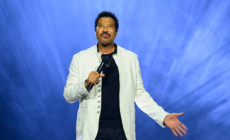-
2025 College Football Rankings: Ohio State Stays No. 1 as Penn State, Texas Slide - 17 mins ago
-
Phillies Manager Talks Not Using Ranger Suarez in NLDS Game 1 - 38 mins ago
-
Lionel Richie reveals he almost became a priest before music career - 40 mins ago
-
‘Cannot forget who he is’ – David Ortiz, ‘MLB on FOX’ crew on Yankees' Aaron Judge finding rhythm - about 1 hour ago
-
Dodgers Announce Will Smith News Ahead of NLDS Game 2 - about 1 hour ago
-
'Now the pressure is on the Phillies' — Derek Jeter after the Dodgers take Game 1 - 2 hours ago
-
The Ladybug Recipe: How a Chef Blends Food, Tech, and Menopause Care - 2 hours ago
-
Eagles Get Concerning Jalen Carter Injury Update Before Facing Broncos - 2 hours ago
-
Tigers' Zach McKinstry drives in go-ahead run in 11th inning vs. Mariners - 2 hours ago
-
San Francisco 49ers Linked to Shocking Mac Jones Trade - 3 hours ago
Trump moves closer to Middle East peace — and maybe the Nobel Prize
WASHINGTON — President Donald Trump likes to enumerate the peace deals he says he forged — seven at last count.
But two that have eluded him potentially mean the most to his legacy and his dogged pursuit of the Nobel Peace Prize.
The first is the Russia-Ukraine war, which is no closer to ending now than when Trump took office in January. The other is Israel’s conflict with Hamas militants in the Gaza Strip.
Here, he may have just achieved a breakthrough.
Up against a Sunday deadline that Trump had set, Hamas said Friday said that it would meet a major condition that the president laid out in his 20-point plan for the war’s end: releasing all the hostages, living or dead. Hamas’ caveat was that “the field conditions for the exchange are met.”
Hamas also said it was prepared to enter into negotiations and turn over administrative control of Gaza to a Palestinian body of technocrats.
Trump had been waiting on an answer from Hamas since Monday, when he released his peace plan at the White House alongside Israeli Prime Minister Benjamin Netanyahu. He took Hamas’ announcement as a good sign.
“Based on the Statement just issued by Hamas, I believe they are ready for a lasting PEACE,” he wrote on his social media site. “Israel must immediately stop the bombing of Gaza, so that we can get the Hostages out safely and quickly!”
Ruby Chen, a hostage family member and a leading advocate, told NBC News: “It’s a positive — we have cautious optimism. We know the president cares a lot about the hostages, so let’s hope this is our time.”
“It’s not done. There are still a lot of missing pieces, but it’s positive,” he added.
Trump posted a video on Truth Social Friday night in response to Hamas’ announcement, saying: “This is a big day. We’ll see how it all turns out. We have to get the final word down in concrete.”
The Middle East is a part of the world where conflict seems eternal, peace sporadic. Since President Harry Truman recognized the Jewish state in 1948, many presidents have tried to usher in peaceful relations between Israel and its Arab neighbors, only to see conflict erupt again and again.
Like Jimmy Carter, Bill Clinton and others before him, Trump is working to negotiate an accord among longtime combatants — an effort that dovetails with the White House’s public campaign to get him the Nobel Prize.
“If not now, when?” said Richard Goldberg, who served on the National Security Council staff in Trump’s first term.
Even some of Trump’s detractors said that Hamas’ new position could be an encouraging step toward ending the war.
“Like the rest of the world, I’m hoping this news means imminent return of the hostages and action addressing the Gaza humanitarian crisis, along with a ceasefire and path to peace and normalizing relations in the region,” Sen. Richard Blumenthal, D-Conn., told NBC News.
Some were more skeptical, questioning whether Hamas can be trusted to follow through on its commitments.
Brian Katulis, a senior fellow at the Middle East Institute think tank, said, “I’d be a bit more cautious given that Hamas is a terrorist organization with a track record of saying one thing and doing another.”
“This may be the beginning of the end, but there is still more work to do,” a former Western diplomat with experience in the Middle East said. “Hamas has not accepted key elements of the plan nor the timeframe for hostage releases. Trump’s call on Israel to halt strikes will call Hamas’ bluff over the coming days. It’s now up to Hamas. We either see hostages coming out this week or the war will restart.”
A European diplomat who has been closely engaged in the process said the situation remained extremely urgent: “Get the hostages home. Worry about the details next.”
The diplomat acknowledged that as with any deal of this kind, the details and terms need to worked out as the process moves forward.
Even if Trump succeeds where his predecessors failed and creates conditions for Palestinians and Israelis to live together peacefully, a Nobel Prize would still be a long shot.
Lawmakers from both parties have criticized the Trump administration for launching deadly attacks on alleged foreign drug boats. Though he has embraced the title “President of Peace,” Trump just rebranded the Defense Department as the “Department of War.”
The prize is awarded each year by five appointees of Norway’s parliament. During Trump’s first term, one member of parliament, Christian Tybring-Gjedde, was at the hairdresser waiting for his wife when his cellphone rang.
Trump was calling.
With the hair dryers whirring, Tybring-Gjedde said he had trouble hearing. The president thanked him for nominating him for the prize, Tybring-Gjedde said in an interview.
Earlier this summer, Trump called another Norwegian, former NATO Secretary-General Jens Stoltenberg, and during the conversation also brought up the prize.
“I’m not sure he [Trump] really understands how this is done,” Tybring-Gjedde said. “The Norwegian government has nothing to do with the Nobel Peace Prize.”
A phone call may not sway anyone, but the Nobel judges would be hard-pressed to defy a president who brokered a Middle East peace deal at long last, Trump’s supporters say.
“It will be interesting if he does pull it off how the Nobel committee manages to ignore the fact that he did it,” former House Speaker Newt Gingrich, a Republican ally of the president, told NBC News.
Source link






























